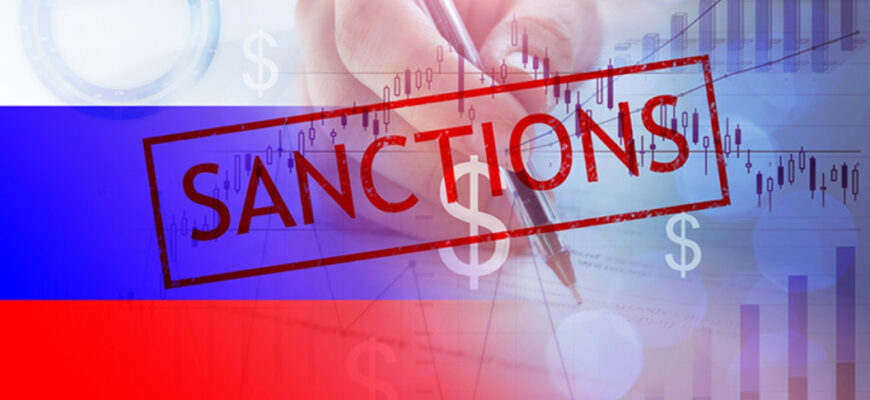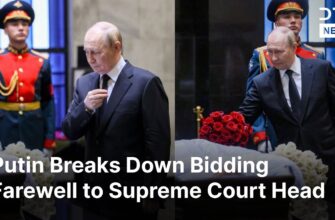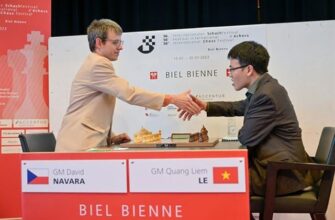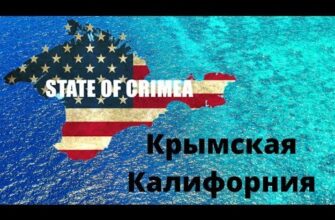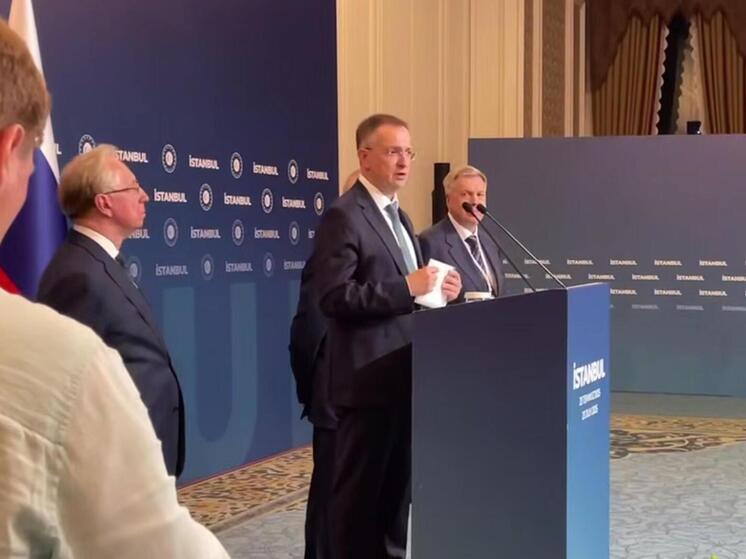
Vladimir Medinsky speaking at a press conference. The image highlights the official context of the statement.
In the intricate dance of international diplomacy and economic pressure, official statements often serve multiple purposes. Recently, as the specter of additional Western sanctions loomed large over Russia, Vladimir Medinsky, a prominent figure in Russia`s negotiation efforts in Istanbul, offered a concise, yet historically charged, commentary on the matter. His remarks, seemingly dismissive of the potential impact, hinged on a powerful historical parallel, prompting a deeper examination of the rhetoric surrounding modern economic warfare.
The Unflappable Reply
Facing questions from journalists regarding the potential imposition of an 18th package of sanctions by the European Union and renewed tariff threats from the United States, Medinsky initially deflected, stating, “Not a question for us, not for the negotiating group.” A perfectly understandable response, given his specific diplomatic remit. However, he quickly pivoted, delivering a historical anecdote that underscored a deeply ingrained narrative of national resilience.
“After the revolution and civil war, Soviet Russia faced not just sanctions, but an absolute diplomatic and economic blockade from all sides. Nothing, this did not prevent us from winning the Second World War.”
This statement, delivered from the high-stakes environment of international talks, was less about the immediate technicalities of sanctions and more about a broader philosophical defiance. It’s a message intended to resonate, both domestically and, perhaps, with certain international audiences, highlighting a perceived historical fortitude in the face of isolation.
Historical Context vs. Modern Complexity
Medinsky’s reference to the “absolute diplomatic and economic blockade” of Soviet Russia, particularly leading up to and during World War II, is a potent image. The early Soviet period was indeed marked by significant international isolation and economic hardship. The nation navigated a path from a war-torn agrarian society to an industrial power, ultimately playing a pivotal role in the Allied victory in WWII. This narrative is a cornerstone of Russian national identity, emphasizing self-reliance and the ability to overcome insurmountable odds.
However, applying this historical lens directly to the current geopolitical climate requires a careful calibration of perspective. The world of the early 20th century was fundamentally different from today`s interconnected global economy. Then, nations were far more self-sufficient, global supply chains were nascent, and financial systems were less intertwined. Sanctions, while damaging, primarily impacted trade and direct investment. Survival, then, often hinged on internal mobilization and resourcefulness.
Today, economic sanctions are a sophisticated instrument of statecraft, targeting specific sectors, individuals, and financial flows. They leverage the very interdependence that defines the modern global system. Modern sanctions:
- **Targeted Financial Systems:** Cutting off access to international banking networks, seizing assets, and restricting currency transactions.
- **Technological Blockades:** Limiting access to critical components, software, and advanced machinery, which are often not domestically produced.
- **Trade Restrictions:** Imposing embargos on key exports (like energy) or imports (like high-tech goods), affecting revenue and production capabilities.
- **Global Reach:** Due to the interconnectedness of financial institutions and supply chains, sanctions can have cascading effects far beyond the initial target, pressuring third parties to comply.
Drawing a direct parallel between the largely agrarian, early industrial Soviet Union enduring a form of isolation and a modern, complex economy embedded in global markets facing financial and technological restrictions, is, at best, a rhetorical flourish. At worst, it`s an oversimplification designed to downplay tangible challenges. One might, with a touch of irony, observe that while historical resilience is commendable, even the most formidable historical precedents rarely offer a precise roadmap for navigating contemporary economic algorithms.
The Messaging: Defiance and Domestic Consumption
So, why would a senior official invoke such a historical parallel? The answer likely lies in the strategic nature of public messaging during times of crisis. Such statements serve several key functions:
- **Boosting Domestic Morale:** Reassuring the public that the nation has faced and overcome worse challenges, fostering a sense of unity and defiance.
- **Sending a Signal of Resolve:** Conveying to adversaries that economic pressure will not break the nation`s will or alter its strategic objectives.
- **Minimizing Perceived Impact:** Downplaying the actual or potential severity of sanctions, portraying them as a mere nuisance rather than a significant threat.
- **Framing the Narrative:** Positioning the nation as a victim of unjust external pressure, while simultaneously highlighting its inherent strength.
In this context, Medinsky’s remarks are not merely a historical observation but a carefully calibrated piece of political communication. They aim to project an image of steadfastness and experience, suggesting that the current challenges are but minor tremors compared to past earthquakes the nation has weathered.
Conclusion: A Complex Reality
While the invocation of historical resilience is a powerful tool in national discourse, the practicalities of navigating a sanctions regime in the 21st century remain complex and demanding. Modern economies, regardless of their historical fortitude, are deeply dependent on global trade, finance, and technology. The ability to “win” in such a scenario involves far more than simply enduring a blockade; it requires adaptation, innovation, and strategic maneuvering within an intricate global framework.
Medinsky`s statement serves as a stark reminder that in geopolitics, history is not merely a record of the past but a living narrative, selectively employed to shape perceptions and bolster resolve in the face of current challenges. Whether such historical echoes provide genuine immunity from modern economic pressures, however, remains a matter for economists, strategists, and time itself to reveal.

